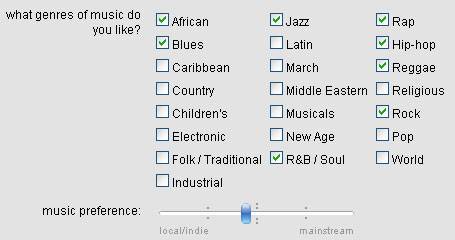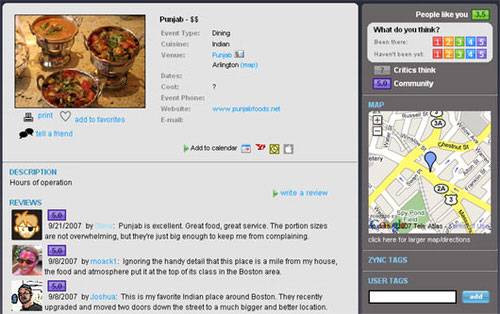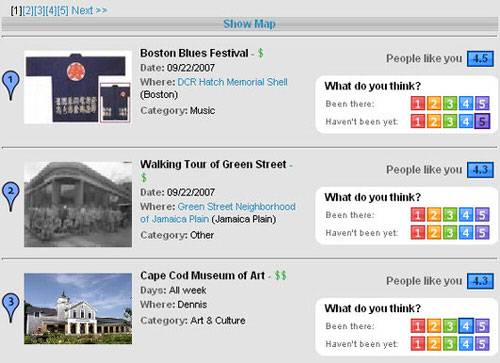Zync, a Massachusetts-based startup, operates a local event recommendation engine based around the city of Boston. The site currently lists 30,000 events across 20,000 venues. And even though it only has 355 users, they have amassed almost 9500 ratings.

According to Zync, their recommendation technology uses patent-pending algorithms to recommend events, activities, and restaurants to users based on the input of other, like-minded people. Theoretically, as with any peer recommendation system, this one would get better and more accurate the more people use it.
Of course that goes two ways: the more people like you who use the service, the more accurate its recommendations will be, and the more you use the service, the more it will learn about what a person like you is like. The way Zync first gets a handle on you is by asking a round of questions about your interests pertaining to food, music, sports, and other activities. After filling out the quick preferences survey, Zync begins to recommend things based on what other people with similar interests as you have rated highly.

In a blog post on the company’s blog from late-August, Zync co-founder Brad Rosen, talked about how as more people use ratings sites, the ratings become less meaningful. 137,000 people combined to give “Sin City” and 8.4/10 on IMDB, for example, but I generally don’t like comic book (or graphic novel) adaptations, so that rating doesn’t really help me.
“ThereÄôs a real need to personalize the way information is presented on the web, especially local information. WeÄôve seen a movement towards “personalization” with netflix and amazon, and I believe this same approach can be applied in other markets, such as travel and “local,” to make it easier for people to find the right information.” — Brad Rosen
Zync recommends things to you based on what people with similar interests said they enjoyed, with apparent disregard to the ratings pool as a whole. I was often recommended things by the service that people supposedly similar to me rated 4/5, while Zync users as a whole rated the same things 2/5. The more you rate events, activities, restaurants, etc. the better the system learns about your tastes and can refine its recommendations.

Zync lets you rate things in two ways: before you’ve visited, or after. Presumably ratings from people who have already been to an event or location are weighted more heavily. Ratings aren’t all you to go by when making decisions about whether an activity is right for you; users are also encouraged to enter reviews. It would be great if Zync could add further context to the reviews by indicating how similar to your tastes the reviewer is.
Search results and lists of recommendations can be very narrowly refined with a great menu of filtering options. For example, events can be filtered by location, venue size, time/date, cost, age restrictions, and even by if they have a casual, trendy, or off-beat vibe among other things.
Events listings are tied in nicely with other services. You can add any listing to your Yahoo!, Google, iCal, or Outlook calendar, and for food listings you can make a reservation through OpenTable. Zync also makes use of Google Maps to provide a visual indication of where events are taking place.

Conclusion
The recommendations that Zync sent my way were mostly pretty accurate. For music events the first thing the site recommended was Soulive, a funk group that I have seen a couple of times and always enjoy. It’s hard not to (unfairly) expect services like this to know everything about you and always make great recommendations. Zync indicates that I probably wouldn’t like Taiwan Cafe, for example, where I ate a great meal two weeks ago and would certainly eat again. But the more people use the service, the more accurate the recommendations will get, and the more things I rate, the better it should get at telling me what I like. Of course, people are unpredictable, and there’s really no way for any system not to sometimes get things wrong as a result.










